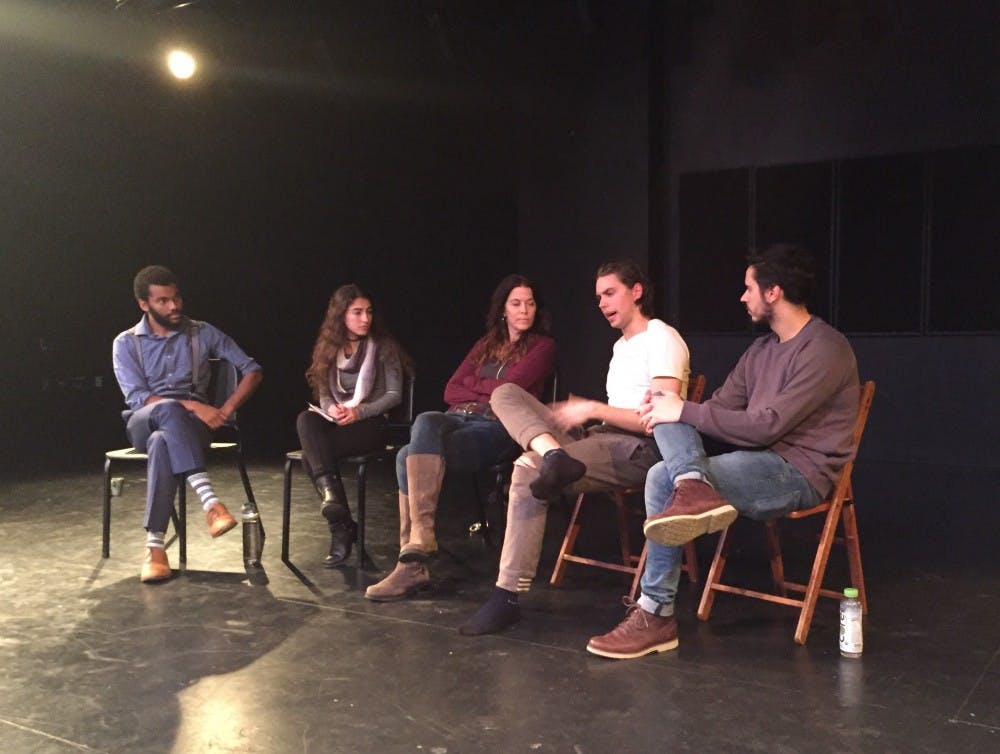As a person who has never seen a Shakespeare play live before, I wasn’t sure what to expect when I decided to see theatre troupe Duomuzi’s production of “Antony and Cleopatra.” I was worried that I wouldn’t be able to keep up with it. I didn’t think I would be so moved.
But, all fears and preconceived notions went out the window once actors Luke Robbins and Ronald Prokeš took the Katzen Studio Theatre stage and immediately established a high level of care and raw emotion. This production was the most incredible introduction to the timeless playwright.
A stunning, intimate look into the fragility of human relationships, Duomuzi’s inspired new twist on the Shakespearean classic stripped it down to its core and found the heart of the play. It told the story of the relationship between Cleopatra and Mark Antony -- from the Sicilian revolt to Cleopatra's suicide during the Final War of the Roman Republic. Duomuzi used only what was necessary to find the truth in the material: two actors, two chairs, one guitar and various incidental props, like a messenger bag and wine bottles. The story was heightened further with original, Americana-style music that was written for the show and performed live, as well as some modern language.
This two-man adaptation of “Antony and Cleopatra” first came about two years ago, when director Colleen Sullivan (now a professor in the Department of Performing Arts) and actors Luke Robbins and Ronald Prokeš decided they wanted to work together again after previously working on a production of “Henry IV.” The catch? They were all going to be geographically separated for a large portion of their rehearsal time.
Through a series of Skype sessions over nine months, Sullivan, Robbins and Prokeš rehearsed and made new discoveries through that medium. After premiering the show at the Brick in Brooklyn, N.Y., they continued to develop the piece, found ways to deepen the relationships they were creating onstage and eventually began touring the show in 2016, performing in London, Cambridge and Greece. In the summer of 2017, the three collaborators took a second tour along the east coast of the United States. Katzen Studio Theatre was their last stop on that tour. Throughout all of the performances, Skype remained a constant of their relationship and they continue to use it to rehearse for their upcoming productions.
In a talkback after the show, Sullivan said that one challenge they faced when translating this show to the stage was recreating the intimacy from the Skype sessions in real life. This intimacy definitely came across well. In portraying their characters’ relationships to each other, Robbins and Prokeš opened themselves up to convey incredible emotional range, demonstrating love, heartbreak, violence, death and everything in between. Though there is much tragedy in this play, they also found the light in these characters’ lives, playing off of each other with a sense of familiarity and comfort with each other. I felt like I was stepping into their lives and taking part in their world throughout the entire production.
With each actor playing multiple roles, it may have seemed daunting to follow along at first. After all, Robbins portrayed Cleopatra, Enobarbus, Octavius Caesar and a Messenger, while Prokeš played Antony, Charmian, Lepidus and a Messenger. Sometimes they would switch between characters in the middle of the scene; sometimes they would play as many as five of them in one scene.
However, these actors seamlessly transitioned between each of their roles, making distinctions that clearly established who they were playing right away. For example, the slightest posture changes elevated or lowered their character’s status, such as Prokeš placing his hand on his hip and leaning against a chair when he switched from the Messenger to Charmian, Cleopatra’s lady-in-waiting.
In their portrayals of women, both Prokeš and Robbins shifted to play these characters in a fine, small, gentle manner. Although they were men playing women, it was clear that that they were treating the characters like human beings, not as stereotypes of women. As Cleopatra, Robbins played this iconic character without treating her as an “icon.” He portrayed the truth in the life of this woman, frequently finding himself positioned on the ground, perhaps because Cleopatra is constantly frustrated and rolling around.
The most emotionally evocative moments of the night, however, were the scenes depicting suicide. In particular, Prokeš’ interpretation of Antony’s suicide was difficult to watch. His version of the scene considers Antony’s inner psyche as that of a boxer who is trained to take repeated strikes to the head and keep going. Prokeš’s Antony ultimately beats himself to death, using his own brute force. I was personally shocked by this and on the verge of tears when Cleopatra (Robbins) walked in on the scene. The show ended with a song mourning “Their Egypt lost,” that left me in stunned silence as the lights dimmed.
The post-performance talkback was moderated by juniors Andrew Watring and Danielle Gallo, students in Sullivan’s directing class. Audience members asked about the company’s process, production and choices they took with this show. From the performance itself to this insightful talkback, audiences were able to grasp a deeper understanding of the material and connect with the creators of the production on a profound level.
And that’s what this production was all about. Humans are complicated, humans desire connection, humans grow and change in the stories they tell and the stories they love. When asked how you know that you’ve found the people you love to work with, Sullivan said that “When you fall in love, you trust that it will last.”
I’ve fallen in love with Shakespeare and with the possibility of what theatre like Duomuzi can bring. This production will stay with me for a long time. What a powerful, unforgettable night.





